
"American Tune" is a song by the American singer-songwriter Paul Simon. It was the third single from his third studio album, There Goes Rhymin' Simon (1973), released on Columbia Records. The song, a meditation on the American experience, is based on the melody of the hymn "O Sacred Head, Now Wounded". The song reached number 35 on the Billboard Hot 100.

Straight Shooter is the second studio album by the English hard rock supergroup Bad Company. The album was released on April 2, 1975, a month after the release of the album's first single, "Good Lovin' Gone Bad", and four months before the second single, "Feel Like Makin' Love".
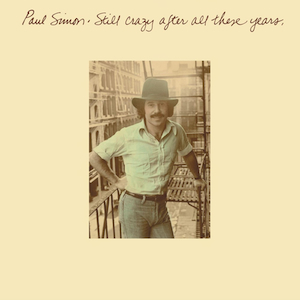
Still Crazy After All These Years is the fourth solo studio album by Paul Simon. Recorded and released in 1975, the album produced four U.S. Top 40 hits: "50 Ways to Leave Your Lover", "Gone at Last", "My Little Town", and the title track. It won two Grammy Awards for Album of the Year and Best Male Pop Vocal Performance in 1976.

Phoebe Snow was an American roots music singer-songwriter and guitarist, known for her hit 1974 and 1975 songs "Poetry Man" and "Harpo's Blues" and her credited guest vocals backing Paul Simon on "Gone at Last". She recorded "San Francisco Bay Blues" also. She was described by The New York Times as a "contralto grounded in a bluesy growl and capable of sweeping over four octaves." Snow also sang numerous commercial jingles for many U.S. products during the 1980s and 1990s, including General Foods International Coffees, Salon Selectives, and Stouffer's. Snow experienced success in Australia in the late 1970s and early 1980s with five top 100 albums in that territory. In 1995 she recorded a gospel album with Sisters of Glory.

The Outfield were an English rock band based in London, England. The band achieved success in the mid-1980s and are best remembered for their hit single, "Your Love". The band's lineup consisted of guitarist John Spinks, vocalist and bassist Tony Lewis, and drummer Alan Jackman.
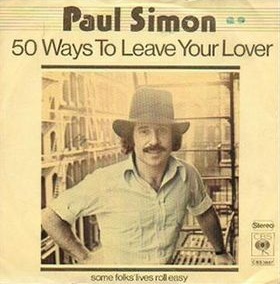
"50 Ways to Leave Your Lover" is a song by the American singer-songwriter Paul Simon. It was the second single from his fourth studio album, Still Crazy After All These Years (1975), released on Columbia Records. Backing vocals on the single were performed by Patti Austin, Valerie Simpson, and Phoebe Snow. The song features a recognizable repeated drum riff performed by drummer Steve Gadd.

"How Long" is the debut single by the English band Ace, from their 1974 debut album Five-A-Side. It reached No. 3 in the US and Canadian charts, and No. 20 on the UK Singles Chart.
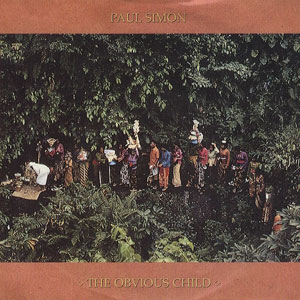
"The Obvious Child" is a song recorded by American singer-songwriter Paul Simon. It was the lead single from his eighth studio album, The Rhythm of the Saints (1990), released by Warner Bros. Records. Written by Simon, its lyrics explore mortality and aging. The song is accompanied by a performance from Brazilian drumming collective Olodum in a live recording.

"Graceland" is the title song of the album Graceland, released in 1986 by Paul Simon. The song features vocals by The Everly Brothers.

"Loves Me Like a Rock" is a song by the American singer-songwriter Paul Simon. It was the second single from his third studio album, There Goes Rhymin' Simon (1973), released on Columbia Records. It features background vocals from the Dixie Hummingbirds, a Southern black gospel group. Although the lyrics are not typically associated with gospel music, the Dixie Hummingbirds were eager to record the song with Simon, and they recorded their own version soon after for their 1973 album We Love You Like a Rock/Every Day and Every Hour.

"Slip Slidin' Away" is a 1977 song written and recorded by Paul Simon which appears on his compilation album Greatest Hits, Etc. It was one of two new songs to appear on the album, the other being "Stranded in a Limousine". Backing vocals on the song are provided by The Oak Ridge Boys. The song was originally recorded and considered for Simon's 1975 album Still Crazy After All These Years, but Simon decided not to include the song on the finished album. A demo version appears on the 2004 re-issue of the album. The song was also included on Negotiations and Love Songs (1988).

"Late in the Evening" is a song by American singer-songwriter Paul Simon. It was the lead single from his fifth studio album, One-Trick Pony (1980), released on Warner Bros. Records.
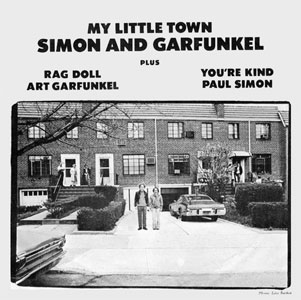
"My Little Town" is a 1975 song by the American duo Simon & Garfunkel. It was written by Paul Simon, who produced the track along with Art Garfunkel and Phil Ramone. The song was included on the 1975 solo releases from both Simon and Garfunkel (Breakaway). It would not appear on any of the duo's albums until the 1997 anthology box set Old Friends and the 1999 compilation album The Best of Simon and Garfunkel. It was the first single release credited to the duo since the 1972 release of "America", released in conjunction with Simon and Garfunkel's Greatest Hits.

"Poetry Man" is a song by the American singer-songwriter Phoebe Snow. It was written by Snow, produced by Dino Airali, and first appeared on her 1974 self-titled debut album.

"Duncan" is a song by the American singer-songwriter Paul Simon. It was the third and final single from his second self-titled studio album (1972), released on Columbia Records. The song was also released as a single in July 1972 as "Duncan" b/w "Run That Body Down".

"Diamonds on the Soles of Her Shoes" is a song by the American singer-songwriter Paul Simon. It was the fourth single from his seventh studio album, Graceland (1986), released on Warner Bros. Records. The song features guest vocals from the South African male choral group Ladysmith Black Mambazo.

"Attitude Dancing" is a song written by Carly Simon and Jacob Brackman, performed by Simon and produced by Richard Perry. The song served as lead single from Simon's fifth studio album, Playing Possum (1975).

"Still Crazy After All These Years" is a song by the American singer-songwriter Paul Simon. It was the third and final single from his fourth studio album of the same name (1975), released on Columbia Records. Though the song briefly reached the top 40 of the Billboard Hot 100 in the U.S., it was a bigger hit on the magazine's Easy Listening chart, where it peaked at number four.

"How Sweet It Is " is a song recorded by American soul singer Marvin Gaye from his fifth studio album of the same name (1965). It was written in 1964 by the Motown songwriting team of Holland–Dozier–Holland, and produced by Brian Holland and Lamont Dozier. The song title was inspired by one of the actor and comedian Jackie Gleason's signature phrases, "How Sweet It Is!"
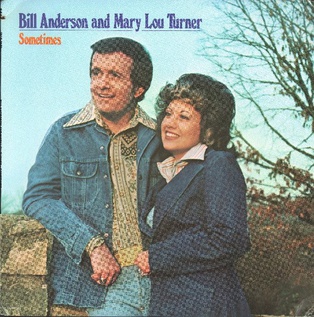
Sometimes is a studio album by American country music artists Bill Anderson and Mary Lou Turner. It was released in January 1976 on MCA Records and was produced by Owen Bradley. It was Anderson's twenty fourth studio recording and Turner's first. The album's title track became a major hit on the country charts in both the United States and Canada. The album also reached major positions on the country chart in the United States. Sometimes was the first collaborative project between Anderson and Turner. Anderson hired Turner to work as his duet partner during this period and the project was one of two recordings they made.



















